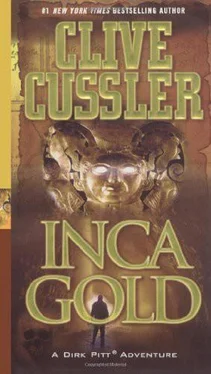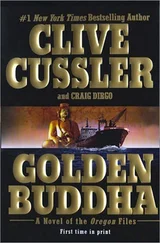"Well, at least whoever he was did us a favor," said Hidalgo.
Maderas looked at him. "Oh, and what was that?"
Hidalgo grinned unfeelingly. "He wasn't in the water long enough to smell."
Three hours later, the patrol vessel entered the breakwater of San Felipe and tied up alongside the Alhambra.
As Pitt had suspected, after reaching shore in the life raft, Gordo Padilla and his crew had gone home to their wives and girlfriends and celebrated their narrow escape by taking a three-day siesta. Then, under the watchful eye of Cortina's police, Padilla rounded everyone up and hitched a ride on a fishing boat back to the ferry. Once on board they raised steam in the engines and pumped out the water taken on when Amaru opened the seacocks. When her keel was unlocked by the silt and her engines were fired to life, Padilla and his crew sailed the Alhambra back to San Felipe and tied her to the dock.
To Maderas and Hidalgo, looking down from their bridge, the forward car deck of the ferry looked like the accident ward of a hospital.
Loren Smith was comfortably dressed in shorts and halter top and exhibited her bruises and a liberal assortment of small bandages over her bare shoulders, midriff, and legs. Giordino sat in a wheelchair with both legs propped ahead of him in plaster casts.
Missing was Rudi Gunn, who was in stable condition in the El Centro Regional Medical Center just north of Calexico, after having survived a badly bruised stomach, six broken fingers, and a hairline fracture of the skull.
Admiral Sandecker and Peter Duncan, the hydrologist, also stood on the deck of the ferryboat, along with Shannon Kelsey, Miles Rodgers, and a contingent of local police and the Baja California Norte state coroner. Their faces were grim as the crew of the navy patrol ship lowered the stretcher containing the body onto the Alhambra's deck.
Before the coroner and his assistant could lift the body bag onto a gurney, Giordino pushed his wheelchair up to the stretcher. "I would like to see the body," he said grimly.
"He is not a pretty sight, senor," Hidalgo warned him from the deck of his ship.
The coroner hesitated, not sure if under the law he could permit foreigners to view a dead body.
Giordino stared coldly at the coroner. "Do you want an identification or not?"
The coroner, a little man with bleary eyes and a great bush of gray hair, barely knew enough English to understand Giordino, but he nodded silently to his assistant who pulled down the zipper.
Loren paled and turned away, but Sandecker moved close beside Giordino.
"Is it. . ."
Giordino shook his head. "No, it's not Dirk. It's that psycho creep, Tupac Amaru."
"Good Lord, he looks as if he was churned through an empty cement mixer."
"Almost as bad," said Duncan, shuddering at the ghastly sight. "The rapids must have beat him against every rock between here and Cerro el Capirote."
"Couldn't happen to a nicer guy," Giordino muttered acidly.
"Somewhere between the treasure cavern and the Gulf," said Duncan, "the river must erupt into a rampage."
"No sign of another body?" Sandecker asked Hidalgo.
"Nothing, senor. This is the only one we found, but we have orders to continue the search for the second man."
Sandecker turned away from Amaru. "If Dirk hasn't been cast out into the Gulf by now, he must still be underground."
"Maybe he was washed up on a beach or a sandbank," offered Shannon hopefully. "He might still be alive."
"Can't you launch an expedition down the subterranean river to find him?" Rodgers asked the admiral.
Sandecker shook his head slowly. "I won't send a team of men to certain death."
"The admiral is right," said Giordino. "There could be a dozen cascades like the one Pitt and I went over. Even with a Hovercraft like the Wallowing Windbag, it's extremely doubtful anyone can gain safe passage through a hundred kilometers of water peppered with rapids and rocks."
"If that isn't enough," added Duncan, "there's the submerged caverns to get through before surfacing in the Gulf. Without an ample air supply, drowning would be inescapable."
How far do you think he might drift?" Sandecker asked him.
"From the treasure chamber?"
"Yes."
Duncan thought a moment. "Pitt might have a chance if he managed to reach a dry shore within five hundred meters. We could tie a man on a guideline and safely send him downstream that far, and then pull them back against the current."
"And if no sign of Pitt is found before the guideline runs out?" asked Giordino.
Duncan shrugged solemnly. "Then if his body doesn't surface in the Gulf, we'll never find him."
"Is there any hope for Dirk?" Loren pleaded. "Any hope at all?"
Duncan looked from Giordino to Sandecker before answering. All eyes reflected abject hopelessness and their faces were etched with despair. He turned back to Loren and said gently, "I can't lie to you, Miss Smith." The words appeared to cause him great discomfort. "Dirk's chances are as good as any badly injured man's of reaching Lake Mead outside of Las Vegas after being cast adrift in the Colorado River at the entrance to the Grand Canyon."
The words came like a physical blow to Loren. She began to sway on her feet. Giordino reached out and grabbed her arm. It seemed that her heart stopped, and she whispered, "To me, Dirk Pitt will never die."
"The fish are a little shy today," said Joe Hagen to his wife, Claire.
She was lying on her belly on the roof of the boat's main cabin, barely wearing a purple bikini with the halter untied, reading a magazine. She pushed her sunglasses on top of her head and laughed. "You couldn't catch a fish if it jumped up and landed in the boat."
He laughed. "Just wait and see."
"The only fish you'll find this far north in the Gulf is shrimp," she nagged.
The Hagens were in their early sixties and in reasonably good shape. As with most women her age, Claire's bottom had spread and her waist carried a little flab, but her face was fairly free of wrinkles and her breasts were still large and firm. Joe was a big man who fought a losing battle with a paunch that had grown into a well-rounded stomach. Together they ran a family auto dealership in Anaheim specializing in clean, low-mileage used cars.
After Joe bought a 15-meter (50-foot) oceangoing ketch, and named it The First Attempt, out of Newport Beach, California, they began leaving the management of their business to their two sons. They liked to sail down the coast and around Cabo San Lucas into the Sea of Cortez, spending the fall months cruising back and forth between picturesque ports nestled on the shores.
This was the first time they had sailed this far north. As he lazily trolled for whatever fish took a fancy to his bait, Joe kept half an eye on the fathometer as he idled along on the engine with the sails furled. The tides at this end of the Gulf could vary as much as 7 meters (23 feet) and he didn't want to run on an uncharted sandbar.
He relaxed as the stylus showed a depression under the keel to be over 50 meters (164 feet) deep. A puzzling feature, he thought. The seafloor on the north end of the Gulf was uniformly shallow, seldom going below 10 meters at high tide. The bottom was usually a mixture of silt and sand. The fathometer read the underwater depression as uneven hard rock.
"Aha, they laughed at all the great geniuses," said Joe as he felt a tug on his trolling line. He reeled it in and discovered a California corbina about the length of his arm on the hook.
Claire shaded her eyes with one hand. "He's too pretty to keep. Throw the poor thing back."
"That's odd."
"What's odd?"
"All the other corbinas I've ever caught had dark spots on a white body. This sucker is colored like a fluorescent canary."
She adjusted her halter and came astern to have a closer look at his catch.
Читать дальше












